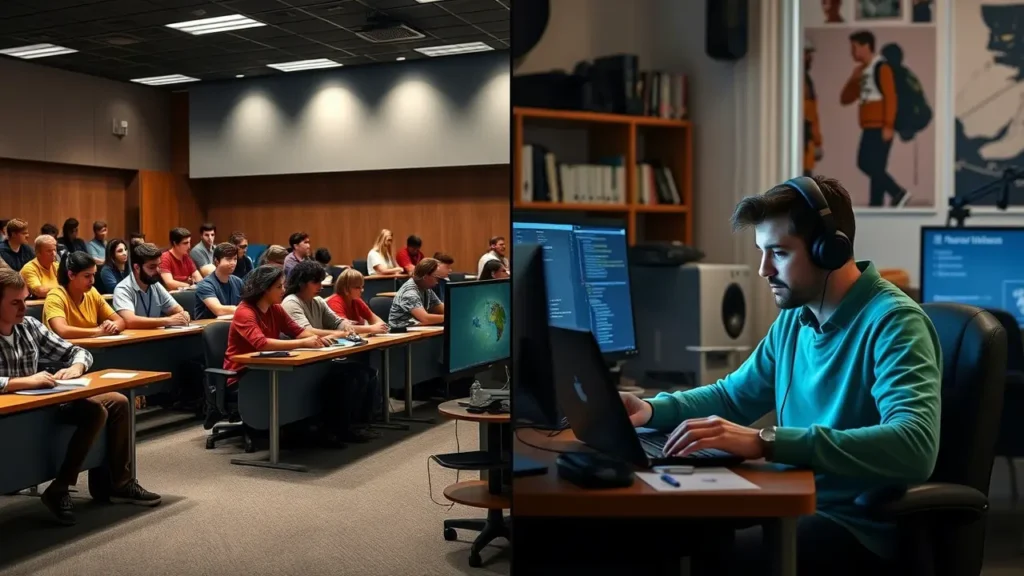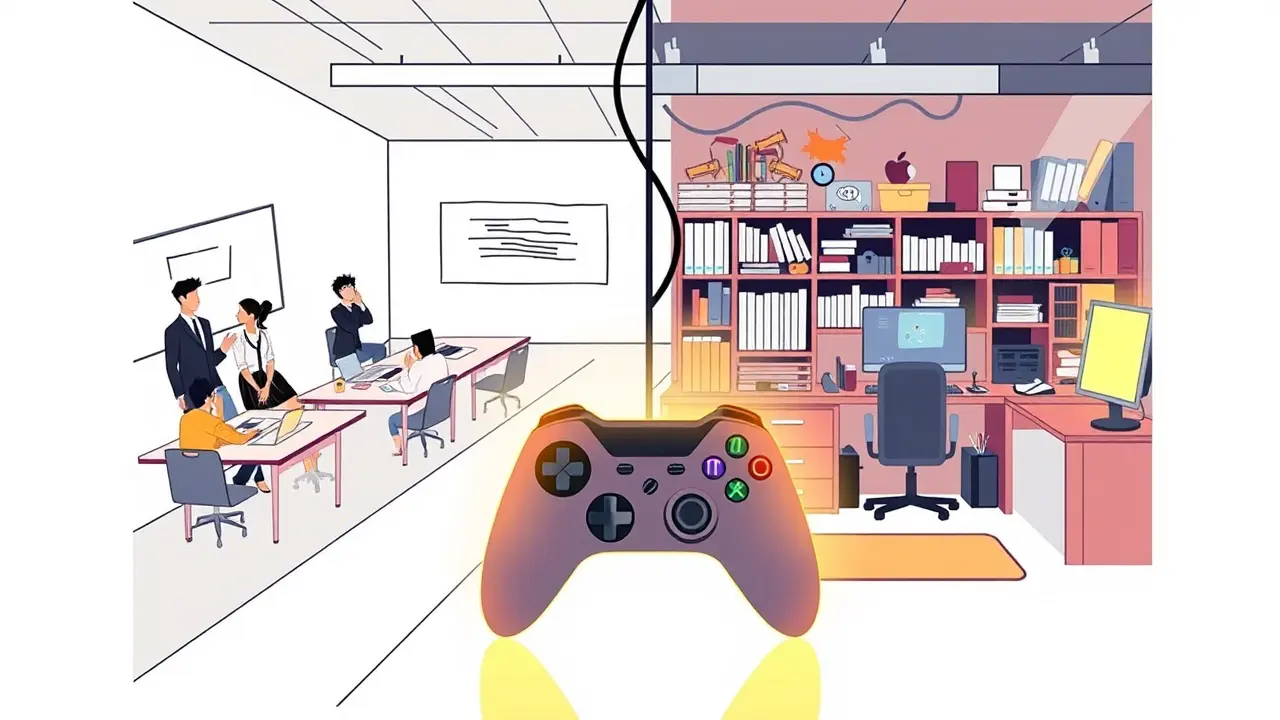
The path to entering the gaming industry has never been more diverse, with multiple educational routes available to aspiring developers. While traditional computer science degrees remain valuable, bootcamps, online courses, and self directed learning have emerged as viable alternatives. Understanding the full landscape of becoming a game developer helps you choose the educational approach that aligns with your goals, timeline, and financial situation for maximum career success.
Traditional University: A Long-Term Investment
University programs in computer science or game development provide a strong theoretical foundation. During my travels to different countries, I’ve met graduates from prestigious schools like DigiPen and Supinfogame who now hold senior positions at major studios.
A university curriculum teaches much more than pure programming. Advanced mathematics, algorithms, data structures, and software architecture form the essential technical base for understanding the complexities of modern game development.
Networking is a major advantage that is often underestimated. Student projects create lasting connections with future colleagues. Some of my most valuable professional contacts date back to my university years. These networks greatly ease the transition into the job market.
However, the financial cost can be prohibitive. In the U.S., a specialized degree can easily cost $100,000. In France, private schools charge between €6,000 and €12,000 per year. This investment is a bet on the future that isn’t feasible for everyone.
Self-Learning: Flexibility and Practicality
Self learning has revolutionized access to game development. Platforms like Unity Learn, the Unreal Engine documentation, or YouTube offer professional-quality content for free.
This approach allows you to learn at your own pace, without geographic or scheduling constraints. A motivated developer can acquire practical skills in just a few months of intense study. There are many success stories: the creators of Stardew Valley and Papers, Please were self-taught.
The freedom to choose your study topics is a huge benefit. Instead of following a fixed curriculum, you can focus directly on your goals whether that’s mobile development, virtual reality, or AI—tailoring your learning to your interests.
The main challenge lies in the self discipline required. Without external structure, many people give up when things get tough. The lack of constructive feedback can also slow progress and lead to bad habits.
Bootcamps: Intensity and Fast Results
Game development bootcamps are emerging as an appealing alternative. These intensive programs, lasting 3 to 6 months, promise fast employability with a moderate investment.
Schools like 42, Le Wagon, or Wild Code School offer hands-on, project based learning. This practical approach helps you quickly build skills that are directly applicable in a professional setting. Their job placement rates are often impressive.
Professional support is a major strength. Job interview prep, employment assistance, and post program follow-up make the transition to the workforce much easier.
However, beware of exaggerated marketing promises. A bootcamp cannot replace years of experience. Theoretical foundations are often superficial, which may limit progression to more advanced technical roles.
Professional Certifications: Targeted Recognition
Unity, Unreal Engine, and other platforms offer official certification programs. These credentials demonstrate specific technical proficiency to recruiters.
Certifications like Unity Certified User or Unreal Engine Associate are accessible to beginners. Higher levels, such as Unity Certified Programmer, require more experience but offer real professional credibility.
The cost is reasonable compared to long-form training. Ranging from €150 to €500 per certification, the investment can pay off quickly. Preparation can also be done alongside a current job.
These certifications are great supplements to other learning paths, though they don’t replace them. They validate technical know-how but don’t teach complex problem-solving or teamwork.
Hybrid Learning: The Best of Both Worlds
More and more developers are adopting a mixed approach that combines formal education and self-learning. This strategy leverages the strengths of each method.
A short general computer science program followed by self-directed specialization in game development works very well. The theoretical foundation makes learning specialized tools much easier.
Alternatively, starting with self-learning and then validating your knowledge through certifications or short courses adds structure and credibility. This path is especially suitable for career changers.
Personal Decision Factors
The best choice depends heavily on your personal situation. Age is an important factor going back to long-term studies at 35 involves different sacrifices than at 20.
Financial constraints naturally steer people toward self-learning or shorter programs. A current salary allows you to learn gradually without financial pressure.
Your learning style also matters. Some people need structured guidance, while others thrive in full autonomy.
The Importance of a Portfolio Over a Degree
The game industry values proven skills above formal degrees. An impressive portfolio opens more doors than a diploma without real-world projects.
Talented self-taught developers are hired by major studios based solely on their creations. Conversely, graduates without personal projects often struggle to land their first job.
This reality levels the playing field between different educational paths. No matter which route you choose, investing time in personal projects is essential.
The Industry Is Always Evolving
The video game industry constantly evolves with the emergence of new technologies and platforms. This rapid pace makes continuous learning more important than initial training.
A great Unity developer today might need to master augmented reality tomorrow. This ongoing need to adapt favors those who know how to learn independently.
Conclusion
No single educational path guarantees success in game development. Passion, perseverance, and adaptability matter more than academic credentials.
Choose the training that fits your constraints and goals, then focus on building projects that showcase your talents. Once your technical skills are solid, make sure to master the essential tools of game development to boost your productivity and employability.

Karaoke Machine
Karaoke Machine with 2 Wireless Rechargeable Microphones: Portable Bluetooth Speaker for Adults & Kids - PA System with Lights Supports TWS/TF Card/USB/AUX for Home Party

Panvola
Panvola Debugging Definition Computer Programmer Student Teacher Geek Coder Tech Support Programming IT Insulated Coffee Mug with Handle and Lid Camping Travel Thermal Mugs 14 oz Black

Razer
RAZER BlackWidow V4 Pro Wired RGB Keyboard White Refurbished

Sound Healing 432 Hz
song transports the listener to a relaxed state of mindfulness and inner peace.

